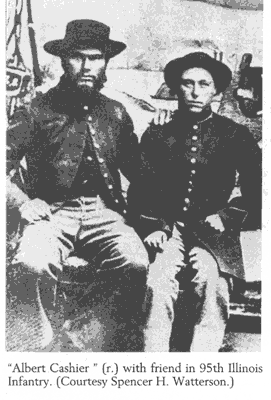Ironically, the perilous injury that Hodgers had avoided through three
years of army service with the fighting 95th Illinois Infantry caught
up with her in Saunemin. In 1911 Hodgers sustained a broken leg in the
course of her work and a physical examination by Nettie Chesbro Rose,
a daughter of her employer, revealed her sex. Now approximately sixty-seven
years of age, Jennie Hodgers, who had lived over fifty years as a man,
faced public exposure. Temporarily, however, her secret remained relatively
secure, as the Chesbros faithfully determined to bury the knowledge
among themselves. But the injury to her leg disabled Hodgers for further
labor, and within a few months a consensus emerged among those who were
keeping her counsel that she could receive better long-term care in
an institution. Thus Hodgers was admitted to the Soldiers and Sailors
Home in Quincy, Illinois, where she remained until 1914.
Once she was at the home, knowledge of Hodgers's sex spread, though
she continued to receive her pension. Even the conservator appointed
to oversee her financial affairs claimed no knowledge of Hodgers's true
identity until March 1913, when the state of Illinois declared Jennie
Hodgers insane, presumably on the grounds that she had been "posing"
as a Civil War veteran named Albert D. J. Cashier . . . . Over the course
of her eighteen months at the state hospital, Hodgers's sex became more
widely known-"Let me tell you, it was a shock," said one of
Hodgers's former neighbors in Saunemin, Ruth Morehart, when she was
interviewed in 1991 about the discovery.
During her time at the state hospital, Hodgers was also required to
resume the attire of a woman. According to a nurse who worked at the
hospital at the time, Hodgers, whom she described as a "dear and
loveable patient," never could accustom herself to wearing a dress,
having worn pants most if not all of her life. Instead, the nurse reported,
with the obvious confusion of pronouns that such a situation produces,
Hodgers "would pull his skirt between his legs and pin it together
to make pants," a habit to which other women on her ward objected,
but which hospital officials decided to permit.
One modern published account of Hodgers's life and career claims that
while she lived at the Soldiers and Sailors Home, Hodgers's mental stability
did in fact come under question, and that the transfer to the state
asylum was justified on the grounds of her shaky mental state. Among
the depositions in her pension file, one certainly finds evidence to
support this claim. "She had a weak mind when I saw her at Quincy,"
recalled a former comrade in 1915, and a resident of the Soldiers and
Sailors Home noted that Hodgers had been placed "in my care on
account of her mental condition. When she was first placed with me her
mental condition varied. She had lucid intervals. She was reluctant
to divulge any of her previous history," and she provided only
disjointed stories about her background.
One could endlessly ponder the roots of Hodgers's alleged mental
imbalance: Did it begin with her uncle's (or her father's) early decision
to dress her in boy's clothing and call her "Albert"? Was
it a consequence of years of gruesome warfare for which her "female
nature" did not suit her? Did masquerading as a man for over
fifty years cause her to become insane? . . . Or, one could ask, was
the state of Illinois's declaration of her mental incapacity even
legitimate, given its timing in relation to the revelation that she
was a woman? Was the declaration perhaps less a statement of reality
than a bureaucratic response to the discovery that this woman had
crossed certain boundaries of social and sexual propriety, not only
living as a man but also taking up arms as a soldier and thereby apparently
staking a claim to a central feature of nineteenth-century American
manhood? However one answers these questions, it is important to note
that . . . Jennie Hodgers's former comrades-in-arms did not condemn
her at the end of her life. Indeed, without exception the deponents
in her pension case spoke favorably of her, and . . . insisted on
providing Hodgers with a true soldier's burial, sending her to the
grave in her soldier's uniform with full military honors when she
died in October 1915. (185-90)



